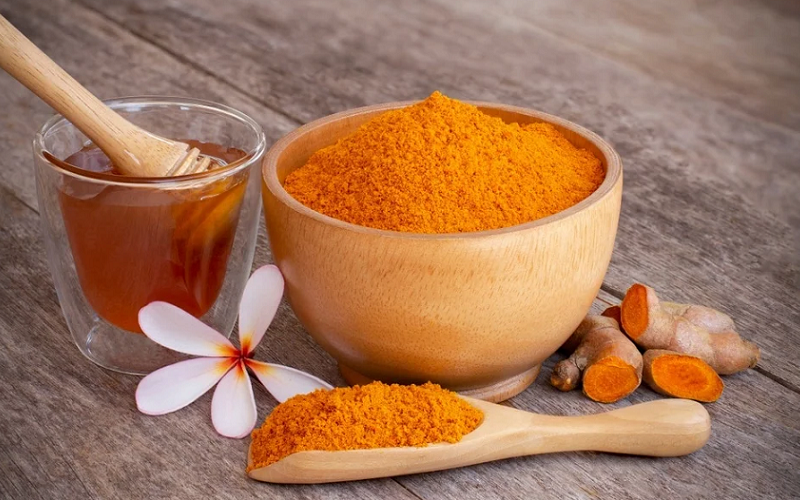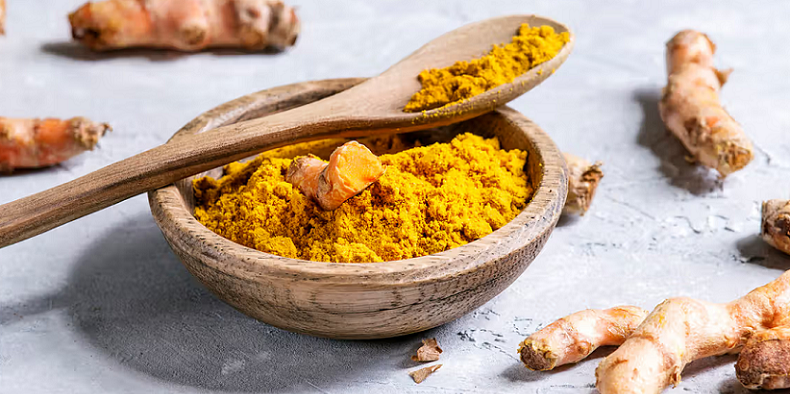
Turmeric, the golden spice revered for centuries in culinary and medicinal traditions, harbors a powerhouse of health benefits, largely due to its active compound, curcumin. Turmeric’s vibrant color and distinctive flavor have made it a staple in kitchens around the world, but it’s the potential health benefits that are truly capturing the attention of scientists and health enthusiasts alike. From its renowned anti-inflammatory properties to its promising role in cancer prevention and mental health, there are a multitude of ways curcumin can enhance our well-being.
Contents
- Introduction to Turmeric (Curcumin)
- Understanding Curcumin
- Health Benefits of Curcumin
- Nutritional Aspects of Turmeric and Curcumin
- References
Introduction to Turmeric (Curcumin)
Turmeric, known scientifically as Curcuma longa, is a bright yellow spice traditionally used in Asian cuisine, particularly in India. Its use dates back nearly 4,000 years to the Vedic culture in India, where it was not only a culinary staple but also held high esteem in religious and ceremonial practices. Beyond its culinary and cultural significance, turmeric has been a cornerstone in Ayurvedic medicine, used to treat a variety of ailments ranging from pain and inflammation to digestive issues.
At the heart of turmeric’s health benefits lies curcumin, a bioactive compound that gives the spice its characteristic yellow color. Curcumin is a type of curcuminoid, a class of compounds known for their potent antioxidant and anti-inflammatory properties. Despite being only a small percentage of turmeric, curcumin’s impact on health is significant, making it the subject of extensive scientific research and health discussions.
Understanding Curcumin
To truly appreciate the benefits of turmeric, it’s essential to understand curcumin, the key compound that lends turmeric its health-promoting properties. Curcumin is not just a simple ingredient; it’s a complex compound with a wealth of health benefits, which we will explore in this section.
Chemical Composition of Curcumin
Curcumin is a polyphenol, a type of natural compound renowned for its antioxidant properties. Its molecular structure comprises two aromatic ring systems connected by a chain of carbon atoms. This unique structure is what gives curcumin its potent biological activities, including its anti-inflammatory and antioxidant properties. Despite its low concentration in turmeric (typically around 3% by weight), curcumin’s impact on health is substantial.
How Curcumin Works in the Body
Once ingested, curcumin exerts its effects primarily through its interaction with various molecular targets within the body. It influences several important biological processes, including inflammation, oxidation, cell signaling, and even gene expression. One of its key actions is the inhibition of an enzyme called COX-2, which plays a significant role in the inflammation process. By modulating this and other pathways, curcumin can effectively counteract inflammation and oxidative stress, two major contributors to many chronic diseases.
The Bioavailability of Curcumin
A critical aspect of curcumin that impacts its effectiveness is its bioavailability, or the extent to which it can be absorbed and utilized by the body. Unfortunately, curcumin is not readily absorbed by the body due to its rapid metabolism and elimination. To enhance its bioavailability, it’s often combined with other substances such as piperine, found in black pepper, which can increase absorption by up to 2000%. This is a crucial consideration when looking at dietary sources or supplements containing curcumin [1].

Health Benefits of Curcumin
Curcumin, the vibrant compound in turmeric, is not just about adding color and flavor to our dishes. It’s a potent ally in maintaining and improving health.
Anti-Inflammatory Properties of Curcumin
One of the most celebrated attributes of curcumin is its ability to fight inflammation, a root cause of many chronic diseases.
Mechanism of Action
Curcumin combats inflammation at the molecular level. It blocks NF-kB, a molecule that travels into the nuclei of cells and activates genes related to inflammation. NF-kB is believed to play a major role in many chronic diseases.
Case Studies and Research Findings
Numerous studies have compared curcumin’s anti-inflammatory properties to anti-inflammatory drugs and found it to be equally effective in some cases, but without the side effects. For example, a study published in the Journal of Alternative and Complementary Medicine found that curcumin was more effective than a placebo in reducing symptoms of arthritis [2].
Antioxidant Effects of Curcumin
Curcumin is also a powerful antioxidant, protecting our bodies from damage caused by free radicals.
Protecting Cells from Damage
Free radicals are reactive molecules that can damage cellular components like DNA and proteins. Curcumin neutralizes free radicals due to its chemical structure and also boosts the body’s own antioxidant enzymes.
Curcumin and Chronic Diseases
The antioxidant properties of curcumin have been linked to reduced risk and treatment of several chronic conditions, including heart disease, Alzheimer’s, and cancer. Its ability to reduce oxidative stress is a key factor in its therapeutic potential.
Curcumin’s Role in Cancer Prevention
Curcumin’s potential in cancer treatment and prevention is a growing area of interest.
Research Overview
Laboratory and animal studies have shown that curcumin can reduce the spread of cancer and inhibit the growth of tumors. It affects cancer growth, development, and spread at the molecular level and has shown promise in killing cancer cells and reducing angiogenesis (growth of new blood vessels in tumors) and metastasis (spread of cancer) [3].
Potential Mechanisms
Curcumin’s impact on cancer cells involves multiple pathways, including cell cycle regulation, apoptosis (programmed cell death), and metastasis inhibition. These effects, combined with its anti-inflammatory and antioxidant properties, contribute to its potential as a cancer-preventive agent.
Benefits of Curcumin for Heart Health
Curcumin’s benefits extend to the heart, one of the most crucial organs in the body.
Impact on Cholesterol and Blood Pressure
Studies have suggested that curcumin can improve the function of the endothelium, the lining of your blood vessels, which is essential for regulating blood pressure and blood clotting. Additionally, it can reduce LDL (bad) cholesterol and triglycerides, contributing to improved heart health.
Curcumin and Heart Disease Prevention
Curcumin’s effects on heart disease are multifaceted. It improves endothelial function, reduces inflammation and oxidative stress, all of which are significant contributors to heart disease [4].
Curcumin in Mental Health
The impact of curcumin on mental health is a promising field, offering new avenues for treating various mental health conditions.
Effects on Brain Function and Mood
Curcumin boosts brain-derived neurotrophic factor (BDNF), a type of growth hormone that functions in the brain. Lower levels of BDNF are linked to various brain disorders, including depression and Alzheimer’s disease. Curcumin’s ability to increase BDNF levels could potentially reverse or delay these brain diseases and age-related decreases in brain function.
Studies on Curcumin and Depression
A study published in the Journal of Affective Disorders showed that curcumin was effective in reducing symptoms in people with major depression. The theory is that it boosts neurotransmitters like serotonin and dopamine, improving mood and alleviating depression.

Nutritional Aspects of Turmeric and Curcumin
While curcumin is lauded for its medicinal properties, it’s important to also consider the broader nutritional profile of turmeric, the spice from which it comes. This section focuses on the nutritional aspects of turmeric and curcumin, highlighting their role in a balanced diet.
Nutritional Profile of Turmeric
Turmeric is more than just a source of curcumin; it’s a nutritional powerhouse in its own right. It is rich in vitamins such as vitamin C, vitamin E, and vitamin K, and is an excellent source of potassium, iron, magnesium, and fiber. These nutrients contribute to various aspects of health, from maintaining immune function to supporting muscle and nerve function [5].
Recommended Daily Intake and Sources of Curcumin
Determining the optimal daily intake of turmeric and curcumin can be challenging due to variations in individual health conditions and the concentration of curcumin in different turmeric sources. Generally, consuming turmeric as part of a balanced diet is considered safe and beneficial. For those considering curcumin supplements, it’s advisable to follow the dosage recommended by healthcare providers, typically ranging from 500 to 2,000 mg of curcumin per day.
Combining Curcumin with Other Nutrients for Enhanced Benefits
Maximizing the benefits of curcumin involves more than just adding turmeric to your diet; it’s about understanding how to enhance its absorption and effectiveness. Combining turmeric with black pepper, which contains piperine, significantly enhances curcumin absorption. Additionally, consuming curcumin with healthy fats like those found in olive oil or avocado can improve its solubility, further boosting its bioavailability.
References
[1] 7 Health Benefits of Turmeric
[2] Curcumin
[3] Turmeric
[4] Curcumin: A Review of Its’ Effects on Human Health
[5] Turmeric Benefits
